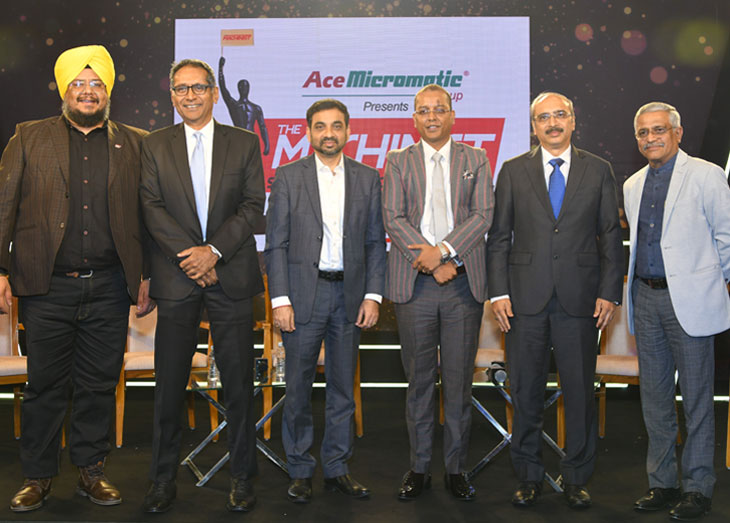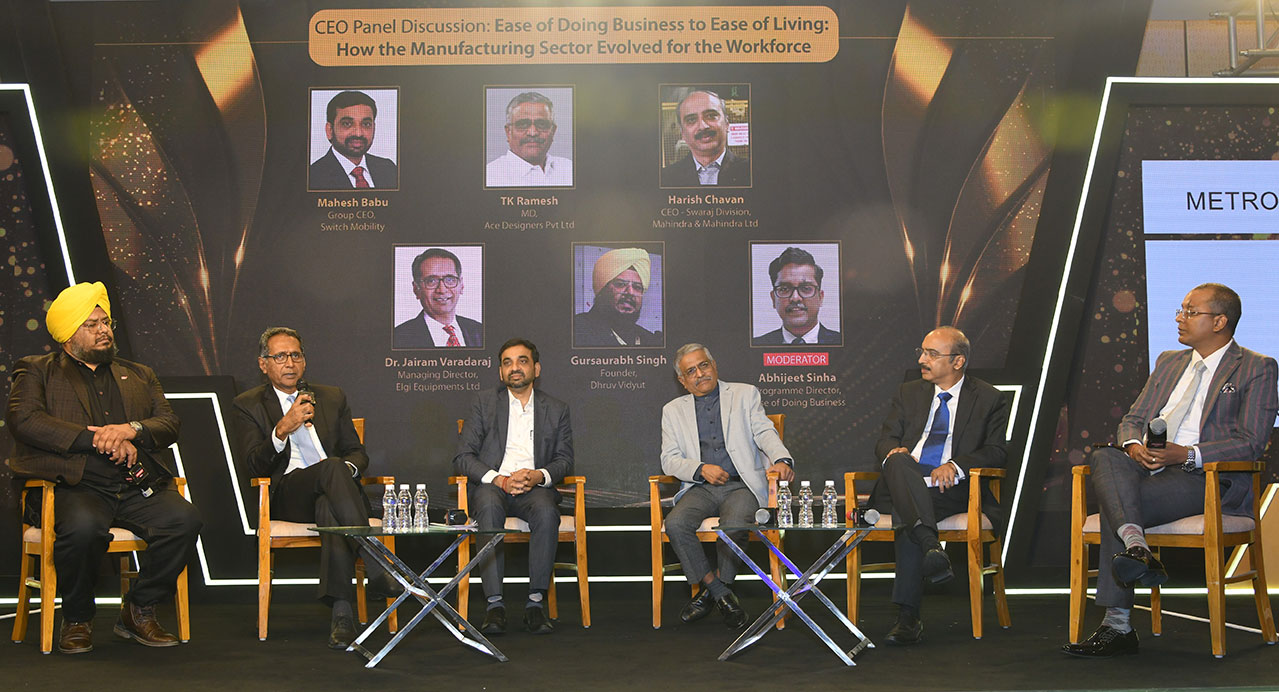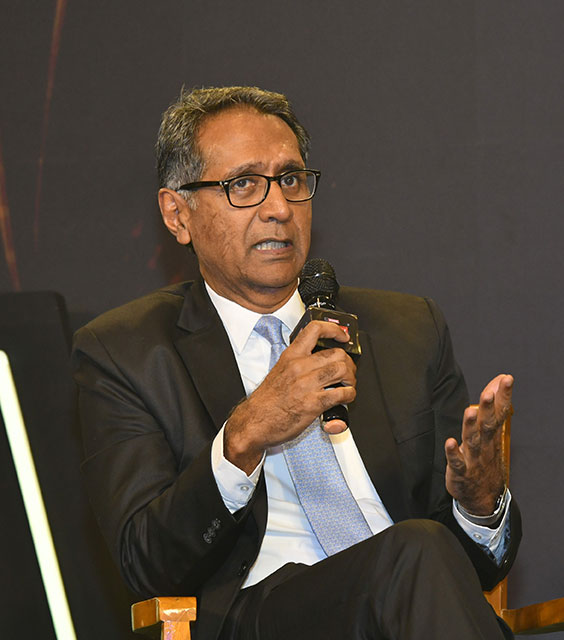EASE OF DOING BUSINESS TO EASE OF LIVING: HOW THE MANUFACTURING SECTOR EVOLVED FOR THE WORKFORCE

The panel deliberated on how Ease of Doing Business is impacting the manufacturing industry. They also discussed how the industry has transitioned from focusing solely on ease of doing business to prioritising ease of living for employees.
Aconducive business environment is a prerequisite for fostering the economic progress of a country. And for a market and country like India, which is now emerging as a manufacturing hub in the world order with its Make in India initiative, a favourable and investor-friendly business environment, and policies, can significantly elevate its growing stature.
While Ease of Doing Business has brought about efficiency and transparency in conducting businesses across the country, it is interesting to study its impact on the Indian manufacturing sector. To review its growing impact - the 9th edition of The Machinist Super Shop Floor Awards 2023 hosted an engaging panel discussion on ‘Ease of Doing Business to Ease of Living: How the Manufacturing sector evolved for the Workforce.’
The panel comprising Gursaurabh Singh, Founder, Dhruv Vidyut; Harish Chavan, CEO - Swaraj Division, Mahindra & Mahindra Ltd; Dr Jairam Varadaraj, Managing Director, Elgi Equipments Ltd; Mahesh Babu, Group CEO, Switch Mobility and TK Ramesh, MD, Ace Designers Limited discussed in length about how Ease of Doing Business is transforming the manufacturing sector and also helping in creating an environment that prioritises the well-being and quality of life for the workforce.

The discussion started with the moderator, Abhijeet Sinha, Programme Director, Ease of Doing Business, asking the panel about the structural reforms that happened over the last nine years and how they have, in any way, translated to the shop floors.
Harish Chavan, CEO of Swaraj Division, Mahindra & Mahindra Ltd, in his opening remarks, said, “The government is making all the efforts to bring investments and ensure that the manufacturing sector is advancing and accelerating. The idea of India emerging as a manufacturing hub is taking shape. Thanks to the multinationals, which are now adopting a new strategy called China Plus. This means they want to create a backup for China, and India is well poised to take over this space, especially with the kind of reforms we have done.”
Besides, he listed three crucial reforms happening on the manufacturing shop floors. The first reform which Chavan pointed out was the advancement in manufacturing technologies. He also touched upon the process improvements and how automation is going to the next level.
The second reform, he indicated, was the creation of policies for employee well-being. According to him, "policies for employee well-being are now taking shape. Along with people-friendly policies, hygiene, health, and safety policies, are now prioritised more."
Another crucial reform Chavan mentioned was the need for an equitable workforce. He said, "The manufacturing sector is witnessing a substantial increase in the participation of women. Besides, their efforts are now getting recognised. Also, the involvement of specially-abled people is increasing. While, we are progressing in manufacturing, we are also getting into softer aspects.”
When asked about the impact of reforms on shop floors, TK Ramesh, MD, Ace Designers Limited, said, "Of course, it is translating on shopfloors. Be it a business or shopfloor – we all want everything to become easier.”
He also quoted an example about how easy it is to book an autorickshaw or cab through an app compared to standing on the road and trying to do it physically. So, the crux is, “the more things get easy, the more we want them to become easier," said TK Ramesh.
Besides, he highlighted that a lot of ease of doing business comes from looking at the right data points. "Since all of us are becoming connected, perhaps, the ease of doing business will get only easier and easier.” Now, "is it a good thing or a bad thing? The time will tell. But I feel we need to get easier and faster,” he added.
When asked about how the comfort of facilitation has translated into the EV industry, Mahesh Babu, Group CEO of Switch Mobility, said, “The EV industry is still evolving. When social media came, nobody knew how to handle it. Likewise, it is happening with EVs.”
However, “The good part is, unlike 100 years of the auto industry, when many regulations were imposed, for the first time, in this evolution and transition to electric mobility, I am seeing that the government, industry, and consumers are all working in tandem with each other. I think I've never seen this before. Today, almost 20- 25 states have EV policies,” he added.
Mahesh Babu further noted that accelerating EV adoption has become more crucial for the government and country, especially from the energy security perspective. “The idea behind accelerating EV adoption is all about making India AatmaNirbhar (self-sufficient) in mobility and energy security. I think the government communicated well on the policies, worked with Industries, and co-created the policies, rather than unilaterally looking at international policies and trying to adapt them, typically the auto industry used to do for years,” he added.
Commenting on EV policies and regulations, the Switch Mobility Group CEO said, “So far, the EV policies were introduced in an orderly manner. At first, they did a pilot and then kept refining it as Fame-I, later FAME-II came, and now we are talking about FAME-III policy. Today, we have PLI schemes, ACC PLI schemes and Auto PLI schemes. I think the government is playing a crucial role here in encouraging EV adoption and it is ensuring that the auto industry transitions well. This is mostly because the auto industry substantially contributes to the GDP and any wrong regulation could lead it to a wrong direction.”
Sharing his perspective, Dr Jairam Varadaraj, Managing Director of Elgi Equipments Ltd, said, "typically, we keep talking about what we don't have and how regulation should improve and give us more freedom and leniencies.” However, “one of the instances completely changed my perspective of doing business in India vis-à-vis any other country. We have been operating in Europe directly over the last 12 years and faced a tough situation in France. And through that situation, I realised how much easier it is to do business in India.”
He further stressed on the fact that “Which country does not have problems or does not have regulations?” But “if you step back and look at it, we are not very difficult to do business anymore. We are good; I mean, there is always room for improvement,” avers Varadaraj. As a matter of introspection, “what we need to reflect on, as people in the industry, is that regulations come because of our misbehaviour. There is a certain amount of over-regulation implemented owing to our wrong behaviour.”
However, Varadaraj believes that “If we create a more purpose-driven organisation, rather than a purely profitled one, then there will be a certain balance in our overall context and behaviour,” adding that “this will reduce the draconian content of legislation and regulation.”

Sharing his perspective, Gursaurabh Singh, Founder, Dhruv Vidyut, said, “I feel that startup India and MSMEs have brought tremendous change and confidence that anybody can step into something complex as manufacturing. One can think about pursuing a career in this field.”
While a lot has been achieved, Singh feels that there's still little room for some improvement. In his opinion, the current emphasis is primarily placed on revenue when it comes to various aspects such as MSMEs, startup valuations, and evaluations. Unfortunately, the significance of research appears to be greatly overlooked.
Singh also agreed to the fact that China plus strategy is the need of the hour and shared an interesting observation. “I have seen that China has always dictated us. If you ask anybody here, which was the first electric vehicle they sat in? I am sure, it would be a Chinese e-rickshaw.” Adding further he said, “the e-rickshaws came and took everything by storm, and everybody else had to follow what they were doing. I saw that happening again with the LED batteries. They got LED batteries, and everybody else had to like it, as they were dictating.”
Furthermore, Singh also highlighted that we are only looking at the revenue aspect rather than research. “We are letting other people research for us. If we have an upper hand on research, it could bring tremendous amount of change,” he added.
Commenting on a question based on Ease of Living, Chavan said, “The vision of Amrit kaal is to create a tech driven knowledge-based economy, which has got strong public finances and financial support. Now for realising this, we will have to mature, create growth in employment and at the same time, dive into the aspects of what is needed to get into the ease of living.”
Further, he noted that there's always a debate of regulators v/s facilitators. “I think we are moving towards facilitators than regulators. There is enough decriminalisation and digitalisation which is happening and to an extent it is helping,” added Chavan.
He also quoted an example from his own industry. According to Chavan, to sell any tractor, one needs to get a government certification, which ideally takes 8-9 months. However, he also mentioned that people are now looking at it differently and are willing to self-certify themselves. “I think it's a big switch from regulation to facilitators. And this shows we are responsible enough to handle this change,” he added.
When asked about a change or support that EV industry needs, to which Mahesh Babu said, “We will have to switch gears both in Industry and government and collectively need to think beyond India. You can't be growing only by domestic consumption; we need to focus on exporting as well. We need to tell the world that I am part of the supply chain of auto industry and have a unique value contribution to make. It is essential for us to inculcate a mindset of beyond India, beyond Indian requirements to the group.”
Dr Jairam Varadaraj shared an interesting insight on role of government in creating equity. According to him, whether it's regulation or facilitation, the government’s core intent is to propel and transform India as a developed nation. “One of the crucial aspects of being a developed nation is not just the size of the GDP; it is how equitable the GDP is.” He further noted that the government cannot play a very legislative role in creating equity. “It is our responsibility to pursue equity as we pursue profit. If we want to facilitate equity and wealth for everyone, we need to see how one can become agnostic of India,” he concluded.
THE MACHINIST


